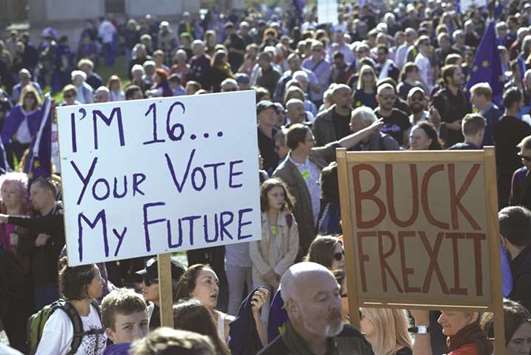The protesters waved the blue and gold flag of the EU and held up “(Expletive) to Brexit” banners under sunny skies to call for another referendum on the eventual deal on how Britain will leave the world’s biggest trading bloc.
The march comes after another tumultuous week for Prime Minister Theresa May in which she failed to agree a divorce deal with EU leaders in Brussels and infuriated members of her own party by making further concessions in the talks.
With just over five months until Britain is due to leave, there is no clarity about what a future trade deal with the EU will look like and some rebels in May’s Conservative Party have threatened to vote down a deal if she clinches one.
James McGrory, one of the organisers of the march, said that voters should have the chance to change their minds because the decision will impact their lives for generations.
“People think the Brexit negotiations are a total mess, they have no faith in the government to deliver the promises that were made, partly because they cannot be delivered,” he said.
At the march, demonstrators carried placards saying “Brexit is pants”, “Time for an EU turn”, and “European and proud.”
Organisers said about 670,000 people took part in the march, which would make it the largest in Britain since a demonstration against the Iraq war in 2003.
The “People’s Vote” campaign, which includes several pro-EU groups, said they had stewards stationed at regular intervals to estimate the size of the crowd.
The police did not provide an independent estimate of numbers participating.
Protesters originally gathered near Hyde Park and then walked past Downing Street and finished outside parliament where they listened to politicians from all main political parties.
Some of the demonstrators came from as far as 1,000km away, from the Orkney Islands off the northern coast of Scotland.
“This is bananas,” demonstrator Jacki Hughes from Lancaster in northwest England told DPA at the event. “This is crazy.”
Her friend, Anthony Brown, complained about potentially having to get a visa to visit continental European countries in the future.
Another demonstrator held a sign with the text “Daddy was here”.
He said he was at the march to fight for his child and wife, who is Italian.
“I think people were misled in various ways,” small business owner Peter Hancock told AFP while tightening an EU flag around the neck of his huge bearded collie.
“We want to stay European,” added his wheelchair-bound wife Julie. “We can’t really see any benefits of leaving, can we, at all.”
Fiona Godfrey represents a group of British immigrants in Luxembourg.
She came to London because Brexit would put up big hurdles to her ability to go back home with her new German husband.
“We would have to meet minimum income rules and I am self-employed,” the 53-year-old said. “I’m losing my voting rights, my right to a livelihood, my freedom of movement – in Luxembourg, which you can cross in 15 minutes.”
London Mayor Sadiq Khan was one of the politicians taking part, writing on Twitter that it was a “historic moment in our democracy”.
“This is the first time in my life I’ve been political,” confessed one 69-year-old demonstrator from southwestern England.
Many students, who were not old enough to vote in the Brexit referendum in 2016, were also taking part in the march.
The People’s Vote march is backed by the Independent newspaper, whose online petition for a second referendum has been signed by some 900,000 people.
Even dogs came along.
Organisers had asked people to dress up their favourite pets in costumes for the march along the scenic route from Hyde Park to Westminster Palace under clear blue skies.
Britain’s 2016 referendum saw 52% vote in favour of leaving the European Union.
However, the past two years have been politically fraught as the government has struggled to agree on a plan and there are fears that Britain could leave the bloc without a deal.
Some opinion polls have shown a slight shift in favour of remaining in the European Union, but there has yet to be a decisive change in attitudes and many in Britain say they have become increasingly bored by Brexit.
The prime minister has repeatedly ruled out holding a second referendum.
“They now want a second referendum to go back to the British people and say ‘Oh, we’re terribly sorry – we think you’ve got it wrong’,” May told parliament on Wednesday. “There’ll be no second referendum. The people voted and this government will deliver on it.”
The opposition Labour party’s Brexit spokesman said last month that his party is open to a second referendum, with the option of staying in the bloc in certain circumstances.
In Belfast in Northern Ireland, around 2,000 people gathered yesterday to oppose Brexit.
Brendan Heading, a 39-year-old IT worker, said he was worried the decision to leave the EU would damage the economy and could lead to the break-up of the United Kingdom.
“I feel that Brexit threatens prosperity and stability,” he told Reuters. “People should have the opportunity to vote for an alternative based on what we now know.”
Brexit supporters held their own rally in the town of Harrogate, in the north of England.
Richard Tice, vice-chairman of Leave Means Leave and one of the speakers at the event, described the people on the march in London as “losers” and said that a second referendum would trigger a constitutional crisis.
“We had a vote, we voted to leave, the idea to have a second referendum would be incredibly damaging,” he said. “People need to be under no illusions as to how people feel about what is a significant potential for a total betrayal of democracy in this country.”

